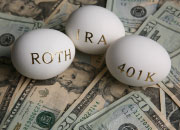Today’s Premium Market IRA Rates
| TIER | CURRENT RATE | ANNUAL PERCENTAGE YIELD |
|---|---|---|
| $0 - $499.99 | No dividends paid | No dividends paid |
| $500 - $9,999 | 4.15% | 4.23% |
| $10,000 - $49,999 | 4.25% | 4.34% |
| $50,000 - $99,999 | 4.35% | 4.44% |
| Over $100,000 | 4.45% | 4.55% |
Features
- Our Premium Market IRA is a tax-privileged savings plan that allows you to earn a higher dividend.
- Monthly dividend fluctuates, depending on what the market rate is.
- Our Premium Market IRA is completely safe, secure, & insured – you won’t lose any money.
- No administrative fees.
- Choose from opening a Traditional or Roth Premium Market IRA.
- Great option for rolling over your 401k or 403b from a previous job.
- Open your Premium Market IRA online, and we can send you all of the forms to sign electronically.
- Make contributions any time you would like via online banking.
- Open Your IRA
- Contributions
- Distributions
- Rates & Disclosures
- Helpful Resources
- Retirement Calculators
Open Your IRA
Open Your IRA
Contributions
Making Contributions to your IRA
With our Premium Market IRA, you can make contributions any time you like via online banking. Simply move the money over by transferring it from another GCEFCU account.
For the 2025 year, your total contributions to all of your Traditional and Roth IRAs cannot be more than:
- $7,000 ($8,000 if you’re age 50 or older), or
- Your taxable compensation for the year, if your compensation was less than this dollar limit.
Your IRA contribution limit does not apply to rollover contributions or qualified reservist repayments (such as natural disasters).
For full details on IRA contribution limits, please click here.
Source: www.irs.gov
If you would like to roll over or transfer directly from an existing IRA to your Gulf Coast Educators IRA, please use the following form.
Distributions
Making Distributions from your IRA
Distributions are withdrawals taken from your IRA. Your Premium Market IRA is designed for retirement use; therefore, there are strict rules for withdrawals on this account.
Traditional IRA Distribution Rules:
- Distributions cannot be taken until the owner is 59 ½ years old.
- Individuals must begin taking IRA distributions once they reach the age of 70 ½.
Roth IRA Distribution Rules:
- Distributions cannot be taken until the owner is 59 ½ years old.
- There is no required age that individuals must begin taking funds out.
For full details on distributing funds from your IRA, please click here.
Early Distributions
In most cases, an individual will be taxed on 10% of their distribution if the money is withdrawn prior to age 59 ½. There are a few exceptions to the rule, though. An individual can take out up to $10,000 if used for any of the following purposes, and must be used within 120 of the withdrawal.
- Qualified higher education expenses
- Qualified first-time home buyer expenses
- Unreimbursed medical expenses based on the AGI (>7.5% AGI; after 2012, 10% if under age 65).
- Health insurance premiums while unemployed
- Expenses associated with permanent disability
- Payment required to an alternate payee under a qualified domestic relations order
Source: www.irs.gov
Rates & Disclosures
Rates & Disclosures
| TIER | CURRENT RATE | ANNUAL PERCENTAGE YIELD |
|---|---|---|
| $0 - $499.99 | No dividends paid | No dividends paid |
| $500 - $9,999 | 4.15% | 4.23% |
| $10,000 - $49,999 | 4.25% | 4.34% |
| $50,000 - $99,999 | 4.35% | 4.44% |
| Over $100,000 | 4.45% | 4.55% |
Dividends compounded monthly
Dividends credited monthly
Dividend Period is monthly
Balance Method is daily
Truth in Savings Account Disclosures
Except as specifically described, the following disclosures apply to all of the accounts.
-
Rate information.
The Dividend Rate and Annual Percentage Yield on your accounts are set forth above. The Annual Percentage Yield is a percentage rate that reflects the total amount of dividends to be paid on an account based on the dividend rate and the frequency of compounding for an annual period. The Dividend Rate and Annual Percentage Yield may change monthly as determined by the Credit Union’s Board of Directors. A withdrawal will reduce earnings.
-
Nature of Dividends.
Dividends are paid from current income and available earnings after providing for the required reserves. The Dividend Rates and Annual Percentage Yields are the prospective rates and yields that the Credit Union anticipates paying for the applicable dividend period.
-
Compounding and Crediting.
Dividends will be compounded and credited as set forth above. The Dividend Period for each account is set forth above. The Dividend Period begins on the first calendar day of the Dividend Period and ends on the last calendar day of the Dividend Period.
-
Balance information.
The minimum balance required to open each account is set forth above. Dividends are Calculated by the Daily Balance method which applies a periodic rate to the balance in the account each day.
-
Accrual of Dividends.
Dividends will begin to accrue on cash deposits on the business day you make the deposit to your term account. Dividends will begin to accrue on noncash deposits (e.g. checks) on the business day you make the deposit to your account. If you close your account before accrued dividends are credited, accrued but unpaid dividends will be paid on term share certificates; accrued but unpaid dividends for all other accounts will not be paid if you close the account before accrued dividends are credited.
-
Transaction Limitations except for checking transactions.
During any statement period, you may not make more than six withdrawals or transfers to another credit union account of yours or to a third party by means of a preauthorized or automatic transfer or telephonic order of instruction. No more than three of the six transfers may be made by check, draft, debit card, if applicable, or similar order to a third party. If you exceed the transfer limitations set forth above in any statement period, your account may be subject to closure by the credit union.
- Fees could reduce earnings on the account.
Helpful Resources
IRA Education Resources
IRA Investing for Beginningers
 Although many employers offer 401k and other retirement options, it’s a good idea to set aside personal funds as well to ensure you can enjoy retirement the way you want to. A great place to start is to invest in an IRA (or Individual Retirement Account).
Although many employers offer 401k and other retirement options, it’s a good idea to set aside personal funds as well to ensure you can enjoy retirement the way you want to. A great place to start is to invest in an IRA (or Individual Retirement Account).
Is a Rollover Right for You?
 Deciding what to do with retirement funds can be a tricky business. Whether you are changing jobs or it is time to make a decision on what to do with a maturing IRA, understanding your options is the best way to ensure you are making the right decision.
Deciding what to do with retirement funds can be a tricky business. Whether you are changing jobs or it is time to make a decision on what to do with a maturing IRA, understanding your options is the best way to ensure you are making the right decision.
Retirement Strategies That Work
 Whether you are close to retirement age, or just starting out in your career, having a strong retirement plan is essential to a financially-stable retirement. Let’s review a few key strategies to get your started.
Whether you are close to retirement age, or just starting out in your career, having a strong retirement plan is essential to a financially-stable retirement. Let’s review a few key strategies to get your started.
Is It Too Late to Begin My Retirement Fund?
 Many people, for one reason or another, have put off planning and saving for retirement until retirement age is just around the corner. Getting a late start with your retirement fund doesn’t exclude you from participation, but it may require you to do a little extra to enjoy the retirement you have always dreamed about.
Many people, for one reason or another, have put off planning and saving for retirement until retirement age is just around the corner. Getting a late start with your retirement fund doesn’t exclude you from participation, but it may require you to do a little extra to enjoy the retirement you have always dreamed about.
Is a Roth IRA the Right Choice for You?
 A Roth IRA is a special type of retirement account where you pay taxes on what you contribute to the account, and then all future withdrawals are tax-free. Investment advisors usually tell their clients that a Roth IRA is designed to benefit younger people — but a Roth IRA can be a good choice for people of all ages. Consider the following to see whether a Roth IRA is right for you.
A Roth IRA is a special type of retirement account where you pay taxes on what you contribute to the account, and then all future withdrawals are tax-free. Investment advisors usually tell their clients that a Roth IRA is designed to benefit younger people — but a Roth IRA can be a good choice for people of all ages. Consider the following to see whether a Roth IRA is right for you.
Retirement Calculators
Retirement Calculators
How much will I need to save for retirement?
How much will I receive in Social Security?
I’m retired, how long will my savings last?
How much can I save with my 401(k)?
Compare Roth 401(k) and Traditional 401(k) retirement savings plans.
How much will inflation affect my retirement?
